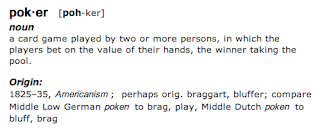Defining Poker
 Had fun again last night playing Hard-Boiled Poker Home Games on PokerStars while watching the opening weekend of NFL football. We’re still pushing through “Season 1” of the HBP HG, playing two tourneys each Sunday night until the end of September. By the end there will have been 20 events in this season, then at the beginning of October I’ll begin a “Season 2” that will play through the end of December.
Had fun again last night playing Hard-Boiled Poker Home Games on PokerStars while watching the opening weekend of NFL football. We’re still pushing through “Season 1” of the HBP HG, playing two tourneys each Sunday night until the end of September. By the end there will have been 20 events in this season, then at the beginning of October I’ll begin a “Season 2” that will play through the end of December.As I’ve mentioned here before, players in each of the events can accumulate points for finishing in the top third of the field, and the one earning the most points for the season is going to win a copy of Poker: Bets, Bluffs and Bad Beats by Al Alvarez. I’m looking into lining up a few extra prizes for Season 2, so that one won’t be a winner-take-all.
I’ve been trying to schedule various games besides no-limit hold’em to keep things interesting. Last night we played pot-limit hold’em (Event No. 13) and what PokerStars calls “Triple Stud” (Event No. 14), the latter rotating between the three stud games in H.O.R.S.E. -- that is, stud (high only), stud hi/lo, and razz.
One of the ongoing challenges when playing Triple Stud was simply to remember which game was being played. The levels only lasted three minutes, which meant the games were switching frequently, and I think just about every one of us at least once started a hand thinking it was one stud variant when in fact it was a different one. Keeping track of the games is part of the challenge of any mixed game format, but I think the test might be slightly more taxing when all of the games are stud and thus superficially appear similar.
Kind of got me thinking a little about how “poker” covers so many different kinds of games. Or, to put it another way, how flexible that word “poker” really is in terms of what it could be said to define.
Heck, when I create Home Games, PokerStars let’s me choose from 17 different poker variants, with a number of those allowing for different betting formats (e.g., no-limit, pot-limit, fixed-limit). And of course there are options for full ring, short-handed, heads-up, different level durations, different starting stacks, and so forth. We couldn’t get through all of different poker games if we played a 100-event series.
Many say there are certain elements that are absolutely essential for a game to be called “poker.” I’ve heard and read a number of attempts at pinning those elements down, with most usually declaring that in order for a game to qualify as “poker,” it must involve cards, money, and bluffing.
Think about it, though... what a huge range of possibility exists for games that include those three criteria. And I’m not even completely sure those three elements are absolutely essential or cannot be modified significantly without carrying the game outside of the boundaries of what we can still call “poker.”
It’s like “literature” or “the novel” or other ambiguous categories or genres, really. One could even argue that as long as participants can agree on rules and that the game is still going to be called “poker,” then it’s poker.
How do you define poker? What elements would you say are utterly essential for a game to be called poker?
Labels: *shots in the dark, games, mixed games, PokerStars Home Games














1 Comments:
Yeah, I led into the first hand of a Razz round without thinking about how sucky my pocket aces were, and had half my stack committed before I realized what the heck I was doing.
Shouldn't Triple Stud properly be called R.S.E (pronounced "arse")?
Post a Comment
<< Home